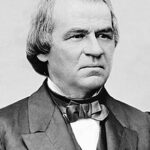The Historic Decision
President Andrew Johnson inherited Lincoln’s mission after the assassination in April 1865. The 13th Amendment ratification became his immediate priority. Johnson recognized that constitutional abolition would prevent future reversals of emancipation policies. ⚖️ This amendment required approval from three-fourths of all states to become law.
Congressional Support and State Campaigns
Johnson worked closely with Republican leaders to secure ratification votes. The amendment needed 27 of 36 states for constitutional adoption. Johnson’s administration pressured reluctant states to approve the measure. 📊 By December 1865, Georgia became the decisive 27th state to ratify.
Constitutional Significance
The 13th Amendment ratification made slavery illegal throughout American territories. Unlike executive orders, constitutional amendments cannot be easily reversed by future presidents. Johnson understood this permanence was crucial for lasting change. 💰 The decision affected millions of enslaved people and transformed the nation’s economic structure fundamentally.
Impact:
Immediate Liberation Effects
The 13th Amendment ratification freed approximately four million enslaved Americans instantly. Former slaves gained legal recognition as free persons under federal law. Johnson’s support helped establish this fundamental human rights milestone. 🔥 However, enforcement challenges emerged immediately across Southern states.
Economic Transformation
Abolition reshaped America’s labor system and agricultural economy completely. Plantation owners lost billions in human property values overnight. The South faced massive economic restructuring without slave labor. 📉 Many former Confederate states struggled with this transition for decades afterward.
Long-term Constitutional Legacy
The 13th Amendment ratification established precedent for future civil rights legislation. It became the foundation for the 14th and 15th Amendments. Johnson’s decision helped create the constitutional framework for equal protection. 🌍 International recognition of America’s commitment to human rights improved significantly. This amendment remains one of the most important constitutional changes in American history.
